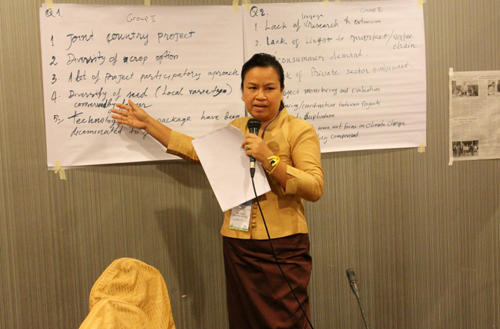Crop diversification strategies for Cambodia, Laos and Vietnam

Bioversity International scientist Ronnie Vernooy and national partner V. Vongkhamsao share some of the discussions at a recent workshop on crop diversification strategies in Cambodia, Laos and Vietnam using insights from past experiences.
By Ronnie Vernooy, Bioversity International and Vongvilay Vongkhamsao, National Agriculture and Forestry Research Institute of Laos
The governments of Cambodia and Lao PDR have made strong commitments to integrate climate change mitigation and adaptation into their national and sectorial development policies and action plans. Vietnam has also started to address climate change adaptation at national and sub-national levels.
Governments in all three countries have identified a series of agriculture-based interventions as priorities to strengthen the resilience of smallholder farmers, most notably, crop diversification. How to practically implement effective policy measures that benefit smallholder farmers, however, remains a challenge. Research could help develop a number of pilot experiences at sub-national scale to test and assess promising measures.
The workshop
With the financial support of the CGIAR Research Program on Climate Change, Agriculture and Food Security's Southeast Asia programme, the National Agriculture and Forestry Research Institute of Lao PDR (NAFRI) and Bioversity International organized a 2-day workshop in Vientiane (2–3 October, 2014) to advance the research agenda on this important topic.
The workshop aimed to: i) share insights gained from past and current experiences of crop diversification strategies and policy measures; ii) identify key elements of effective measures to adapt to climate change through crop diversification; and iii) generate new ideas for research on crop diversification strategies and policy measures in Cambodia, Lao PDR and Vietnam. Three country desk reviews on past and ongoing crop diversification experiences were prepared as inputs for the workshop.
Deliberations
Workshop participants observed that crop diversification can be analyzed at different levels, from crop variety to cropping system to farming system to agro-ecological landscape. When it comes to deciding about the goals and strategies of research interventions and policy measures in support of crop diversification, defining the scope precisely is a first important step. In South East Asia, diverse farming systems (e.g. home-gardens, rice-fish farms, agroforestry farms) can be found along mostly rice-based farms. Several of the participants emphasized the need in the three countries to diversify the monoculture rice-based systems in light of recent unpredictable weather patterns, droughts and floods.
The benefits of practicing crop diversification can be in the form of contributions to: food security, nutritional diversity, income generation, energy supply, plant and animal pest and disease control, soil conservation, plant genetic resource conservation, efficient water use, climate change adaptation and the maintenance of local culture. Although past experiences demonstrate that such benefits can be generated, what is not well known is how to evaluate trade-offs between strategies, with different degrees of crop diversification at various levels. Other important knowledge gaps identified by workshop participants included the influence of consumer demand and changing eating habits, and the ways in which markets and value chain development can support crop diversification.
The way forward
NAFRI Director General Dr Bounthong Bouahom acknowledged that the workshop had produced useful insights in the strengths and weaknesses of crop diversification experiences in the three countries and the wider Asian region. He hoped that these insights would lead to a new joint research project that would show policymakers the way forward while at the same time contribute to the implementation of NAFRI’s new agenda for 2016-2025, in which the sustainable use of agricultural biodiversity and climate change adaptation are two of its six key research themes. In the coming months, Bioversity International and NAFRI will be producing a workshop report and a publication containing the three desk reviews.
Workshop inputs
The Cambodia report was prepared by Khun Leang Dak, the Lao PDR report by Thongkhoun Sisaphaithong, Chay Bounphanousay, Chanhsamone Phongoudome, Chanthakhone Boualaphanh, Vongvilay Vongkhamsao, Souny Phomdouangsy and Souvanh Thadavong, and the Vietnam report by Dinh Huu Hoang and Nguyen Quoc Tuan. Workshop discussions were further enriched by presentations by CIP, CIAT and Bioversity International on research done on crop and agricultural diversification practices and policies. Christopher Wheatley presented CIP’s experiences, Tassilo Tiemann the experiences of CIAT, and Michael Halewood and Ronnie Vernooy the experiences of Bioversity International.
Photo: Presenting group work during workshop in Lao. Credit: Bioversity International/R.Vernooy
